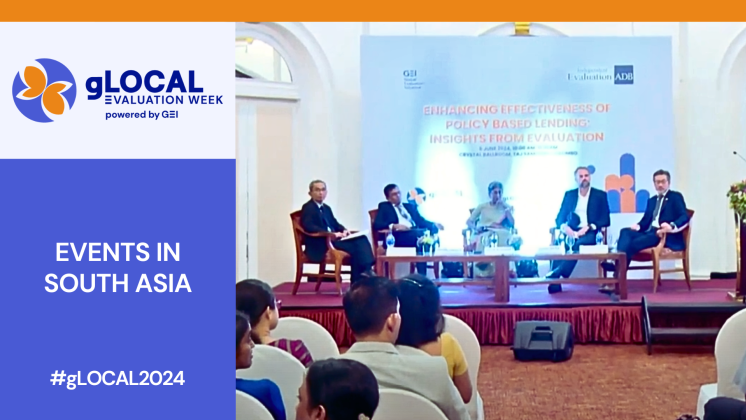gLOCAL Evaluation Week 2024 in South Asia

This year was the sixth edition of the annual gLOCAL Evaluation Week, a global monitoring and evaluation knowledge-sharing event organized by the Global Evaluation Initiative (GEI). With over 370 events held across the world, gLOCAL 2024 attracted thousands of participants through in-person, virtual, and hybrid events. The Center for Learning on Evaluation and Results for South Asia (CLEAR-SA), an implementing partner of GEI, convened events across the South Asian region.
gLOCAL 2024 focused on the theme “Evaluation and Transformational Change: Balancing Ambition and Realism,” with 33 thought-provoking events in South Asia from 24 organizations across Cambodia, India, Nepal, and Sri Lanka. Organizers presented and discussed monitoring and evaluation (M&E) best practices and innovations that explored what transformational change could look like within their respective sectors, with expert panelists from non-government organizations (NGOs), governments, donors, voluntary organizations for professional evaluation (VOPEs), and the private sector.
An important area of discussion this year was transformational change, or systems-level change, through country-led evaluations. For instance, the World Food Programme explored equitable and inclusive transformational change, drawing from experiences of middle- and lower-income countries.
The BRICS New Development Bank showcased successes and challenges in using evaluations to drive meaningful transformation, while the Asian Development Bank and the Sri Lanka Resident Mission jointly discussed lessons learned in policy-based lending to achieve medium- to long-term development goals, using Sri Lanka as an example.
Another key way of driving transformational change is through M&E capacity building, by developing and sharing innovations in M&E methods and practices. This year, Sambodhi Capacity and Learning Institute and the Community of Evaluators ̶ South Asia put together a three-part masterclass in evaluation design. Organizations such as Grassroots Research and Advocacy Movement, the Indian School Of Development Management (ISDM), Gender and Equity Network South Asia (GENSA), and IDinsight, among others, shared various insights on community participation, integrating marginalized communities, and alternative methodologies in evaluation.
CLEAR-SA and the Abdul Latif Jameel Poverty Action Lab South Asia (J-PAL South Asia) conducted an event titled From Numbers to Narratives: The Art of Data Storytelling in M&E. With the unprecedented volume of data and analytics technologies available today, data, usually, does not speak for itself. Data requires context, narratives, and visualizations to make the audience understand the numbers and evoke empathy for the lives behind those numbers. This session sought to build capacities to use M&E data to better communicate.
During the session, the anatomy of a data story was discussed, as well as the process behind crafting meaningful and compelling data-driven narratives for communicating M&E insights to a diverse audience to influence policy decisions and drive transformational progress. The workshop was led by Sourav Das, Capacity Building Manager at CLEAR-SA, and built on the insights learnt from over a decade of CLEAR-SA’s work in evaluation capability development (ECD) in South Asia.